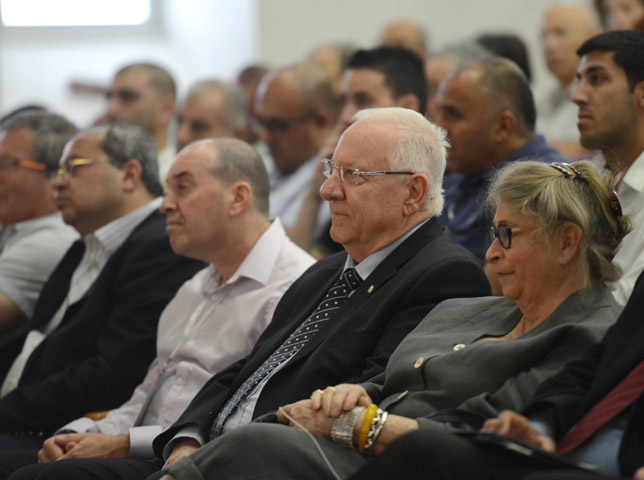On Thursday, May 28, 2015 President Reuven Rivlin received an award from the
International Friends of Givat Haviva (The Center for a Shared Society) for his work to promote cooperation and partnership in Israeli society.
Speaking at the award ceremony, President Rivlin said, "The vision of living together, so needed in Israeli society, is one that deals with the shaping of a civil language, with the building of a joint economy, and the forging of a 'shared Israeli identity'.
The greatest mission before us is establishing trust between the sides. Both sides must understand and accept that a positive identity, historical roots, a connection to a people, to a culture, to a heritage - are not a threat. On the contrary. Despite the tension and the challenge, these constitute the basic and most vital infrastructure in our ability to accept and understand the other's identity. Any attempt to achieve change by way of demands or expectations by one side of the other to relinquish their identity is destined to fail. Not just because it is immoral, but because it is also ineffective.
The Jewish public must acknowledge that the Arab public is part and parcel of this land - a public shaped by a collective cultural identity. To the same extent, and regardless of threats or fear, the Palestinian consciousness and history must never be defined as an opposition or resistance to Zionism or the Jewish people. When we seek confidence building measures between Jews and Arabs, we must work to nurture the positive identities of each side, and from within these identities, reach out to the other's culture and story.
Such outreach is first and foremost found in language. The Hebrew language must be learned to perfection by the Arabic population, but the time has come, that also the Arabic language will be learned by the Jewish population. Language leads from the ear to the heart."
 Copyright: GPO/Mark Neiman
Copyright: GPO/Mark NeimanPresident Rivlin went on to stress that confidence building measures between Jews and Arabs required dealing with the narrowing of the gaps between the sectors in terms of budget and infrastructure allocation, and went on to note that after 67 years in which no new Arab city or town had been built, the time has come to do so in accordance with the government resolution passed in July 2008, and which received approval from the national planning committee.
He stressed that confidence building measures needed to be taken by both sides. He said, "There is not, and should not be an expectation on behalf of the Jewish public, that the Arab public would sing Israel's national anthem with eyes glistening, however, there is a just and understandable expectation that the Arab population accept the rules of democracy and citizenship, rules which guide us, and that they play a meaningful role for the benefit of Israeli society in general. Accordingly, the Jewish public in the State of Israel, expects and will continue to expect to hear clear condemnation of those within the Arab community who continue to align themselves with the worst of our enemies, and those who seek to undermine Israel's very right to exist. Similarly, the Jewish public in the State of Israel, expects and will continue to expect from the Arab public, a sense of solidarity and mutual responsibility, as exhibited by the undertaking of public and community service, and concern for the public well-being."
The President concluded, "I did not come here today to receive an award or recognition. A life's mission of formulating a partnership between us remains incomplete, and in any way, I see no reason for awarding a prize for a mission which still lies before us. As a lover of the land of Israel in its entirety, the things I have said here today I will continue to say, from any platform in any place, in Givat Haviva, Ariel, Kafr Qasem and Hebron. And I believe that I will merit to receive this prize on behalf of all of us."
Givat Haviva is a non-profit organization founded in 1949 as the national education center of the Kibbutz Federation in Israel. It is dedicated to promoting mutual responsibility, civic equality and cooperation between divided groups in Israel as the foundation for building a shared future and shared society - critical elements of a sustainable and thriving Israeli democracy. To this end, Givat Haviva serves as a catalyst in activating divided communities to work together towards achieving their common goals, while engaging in a process of interaction, support and empowerment. This is done through facilitating cross-community projects; leading training and capacity building activities; convening seminars, workshops and conferences to cultivate concrete ideas that foster change; and translating these ideas into action. A leader in its field, Givat Haviva was awarded the
UNESCO Prize for Peace Education in 2001 for its longstanding work in promoting Jewish-Arab dialogue and reconciliation.